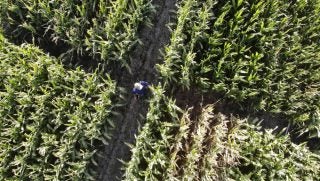“We should know who is buying up American’s farmland and for what purpose,” said Joe Maxwell, former Missouri lieutenant governor and current farmer (his perspective is questionable, though, and we’ll get to that in a moment).
Currently, federal law requires foreign entities to disclose to the U.S. Department of Agriculture information related to foreign investment and ownership of U.S. agricultural land. However, according to a video report from Investigate TV titled Secret Acres: Foreign-owned agricultural land inaccurately tracked by government, those disclosures are inaccurate. For example in Missouri, the report showed that no matches were found when comparing federal and county records.
“If we don’t have accurate information on who holds the title or who holds the deed, then we’re no longer even upholding the basic system of property rights in the United States,” said Loka Ashwood, a professor at the University of Kentucky who studies agricultural policy and rural trends.
Maxwell has been labeled in the past as a “hired gun” for certain advocacy (and hardline activist) groups that want to seem like they have a legitimate farmer in their corner. His pedigree suits him, since he’s a hog producer and former elected official of a heavy farm state.
But Maxwell has worked with Cory Booker on the anti-CAFO bill and once held an executive position with the Humane Society of the United States, an organization that has regularly attacked agriculture. In the video, he said he would like to see companies penalized for not disclosing their affiliations, though he has generally trended toward being against certain “big ag” segments of the industry. In addition he believes that there should be a cap on foreign ownership.
In similar findings, between 2004 and 2014, the Midwest Center for Investigative Reporting databases show foreign investors doubled their American farmland holdings, growing from 13.7 million to 27.3 million acres.
Government officials have also noticed the increase in foreign investors buying American farmland. U.S. Senate by Sen. Debbie Stabenow (D-Michigan) and Sen. Chuck Grassley (R-Iowa) introduced the Food Security is National Security Act of 2017, which “amends the Defense Production Act of 1950 to: (1) require the Committee on Foreign Investment in the United States to consider the potential effects of a proposed or pending transaction on the security of the U.S. food and agriculture systems, including the effects on the availability of, access to, or safety and quality of food; and (2) include the Secretary of Agriculture and the Secretary of Health and Human Services as members of the committee.” However, that bill stalled and has not been revisited since.
“We need to make sure that the farmers and the communities in this country and this state, that the people who are operating here, have a real stake in what they leave behind,” Wes Shoemyer said.
The investigation calls on the need for transparency. It also calls into question the current procedures and the need for accurate reporting.
“As we think about the future and the growing global population, it’s important to consider who will control the food supply. Today, there may not be a food shortage in the world, only distribution problems that are more the result of politics and not logistics, but in the decades to come, it may be a different story,” Iowa Republican Sen. Chuck Grassley has said.
It’s not just a concern about who owns what, but rather what their intentions are. Many of the farm properties currently owned by foreign entities are slated for wind farms rather than grain farming. But, the fact that a nation such as China has a grip on American farmland suggests that there are deep strategies at play to ensure their food security well into the future, when China may not have as much available land amid continued population growth.
Conversely, with the U.S. being such a major food exporter already, it’s possible that American farmers could be put in a weaker position to feed the nation’s citizens if export contracts and foreign land ownership become overly dominant.
While all seems generally friendly for now, the sudden change to more foreign ownership has had many concerned for the past decade. And for younger Americans seeking entry into the business of farming, these moves should be taken into consideration.


